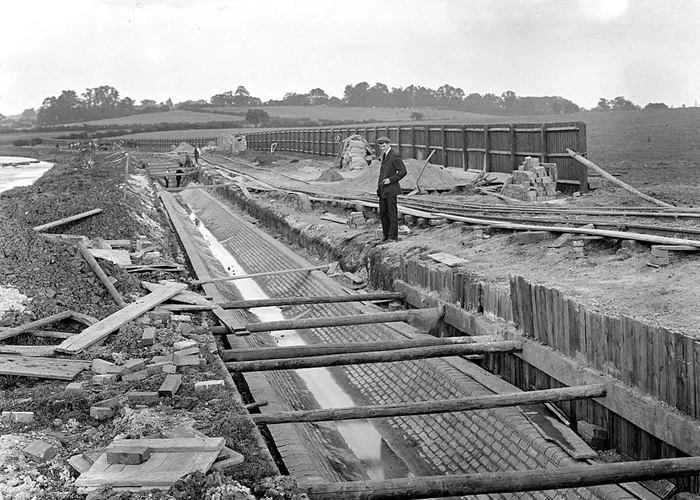December 24 has witnessed a variety of notable events throughout British history, ranging from infrastructural advancements to poignant moments during wartime. Below is a detailed exploration of these historical occurrences, highlighting their significance and context.
What Happened on December 24 in British History?
The Restoration of Piped Water to London (1508)
On December 24, 1508, London houses received piped water for the first time in over a thousand years. This marked a significant advancement in urban infrastructure since the fall of the Roman Empire, which had established an extensive aqueduct system. The restoration of piped water was pivotal for public health and sanitation, allowing for cleaner living conditions and reducing the prevalence of waterborne diseases.The initiative was part of broader efforts to modernize the city and improve living standards. Prior to this, residents relied on wells and rivers, which were often contaminated. The reintroduction of piped water not only enhanced daily life but also symbolized the beginning of modern urban planning in Britain.
The Christmas Truce (1914)
One of the most remarkable events associated with December 24 is the Christmas Truce during World War I, which began on Christmas Eve in 1914. This unofficial ceasefire occurred along the Western Front and involved British and German soldiers. Soldiers on both sides initiated a truce after hearing each other singing carols and exchanging greetings across the trenches.As night fell on December 24, many British soldiers reported seeing German troops lighting candles and placing them on their trenches, creating a festive atmosphere amidst the horrors of war. The following day, soldiers emerged from their respective trenches to meet in No Man’s Land, where they exchanged gifts, shared food, and even played impromptu games of football.This event is often remembered as a poignant moment of humanity amidst the brutality of war. It demonstrated that even in times of conflict, shared cultural traditions could foster goodwill and camaraderie among enemies. However, it was also a fleeting moment; higher command quickly discouraged such fraternization thereafter.
The Establishment of Regular Radio Broadcasts (1922)
On December 24, 1922, the British Broadcasting Corporation (BBC) transmitted its first regular entertainment radio broadcasts. This marked a significant milestone in media history, as radio became a primary source of news and entertainment for millions across Britain.The BBC’s establishment aimed to provide impartial news coverage and cultural programming to enhance public life. Over time, radio evolved into an essential medium that shaped public opinion and culture throughout the 20th century and beyond. The introduction of regular broadcasts transformed how information was disseminated and consumed by the public.
Historical Context: The First General Election with Women’s Suffrage (1918)
Although not directly on December 24, it is worth noting that just days later, on December 28, 1918, Britain held its first General Election in which women were allowed to vote. This event was monumental in British history as it represented a significant step towards gender equality.The suffrage movement had gained momentum throughout the early 20th century, culminating in this landmark election where women over the age of 30 were granted voting rights. This change not only empowered women but also reshaped British politics by introducing diverse perspectives into governance.
The Death of King Henry I (1135)
Another notable historical figure associated with December is King Henry I of England, who died on December 1, 1135. Although this event occurred earlier in the month, its implications reverberated through subsequent weeks leading up to Christmas.Henry I was instrumental in establishing royal authority after William the Conqueror’s reign. His death led to a succession crisis that ultimately resulted in civil war known as “The Anarchy,” pitting his daughter Matilda against her cousin Stephen for control of the throne. This period significantly impacted English governance and set precedents for future succession laws.
The Impact of World War II on Christmas Celebrations
During World War II, Christmas celebrations were deeply affected by the ongoing conflict. On December 24, 1943, British naval forces engaged in operations against German battleships in the North Sea. As families prepared for holiday festivities at home, many servicemen faced perilous situations abroad.The war influenced how Christmas was celebrated; many families experienced loss or separation from loved ones serving overseas. Despite this adversity, communities often rallied together to support each other through charitable initiatives and shared celebrations.
Conclusion
December 24 serves as a reminder of both progress and human connection throughout British history. From infrastructural advancements like piped water systems to poignant moments like the Christmas Truce during World War I, this date encapsulates significant events that have shaped societal norms and historical narratives.As we reflect on these occurrences, it becomes clear that December 24 is not merely a day marked by holiday celebrations but one rich with historical significance that continues to resonate within contemporary society. Each event contributes to our understanding of Britain’s past and highlights the enduring human spirit amidst challenges faced throughout history.
Related Topics:

